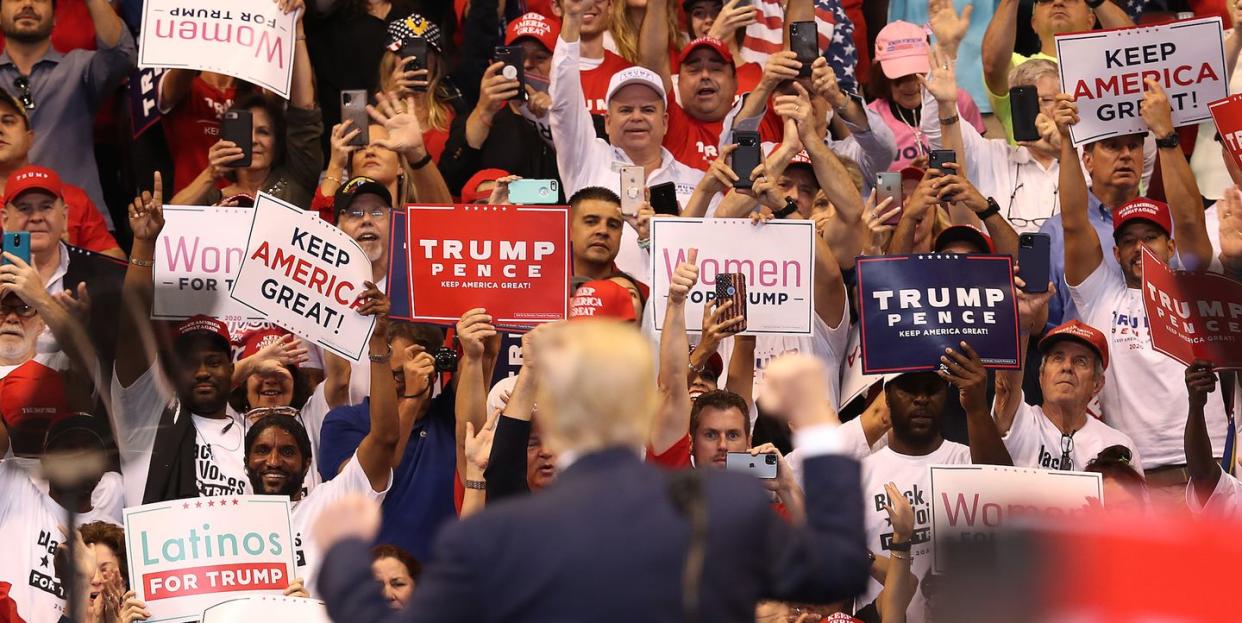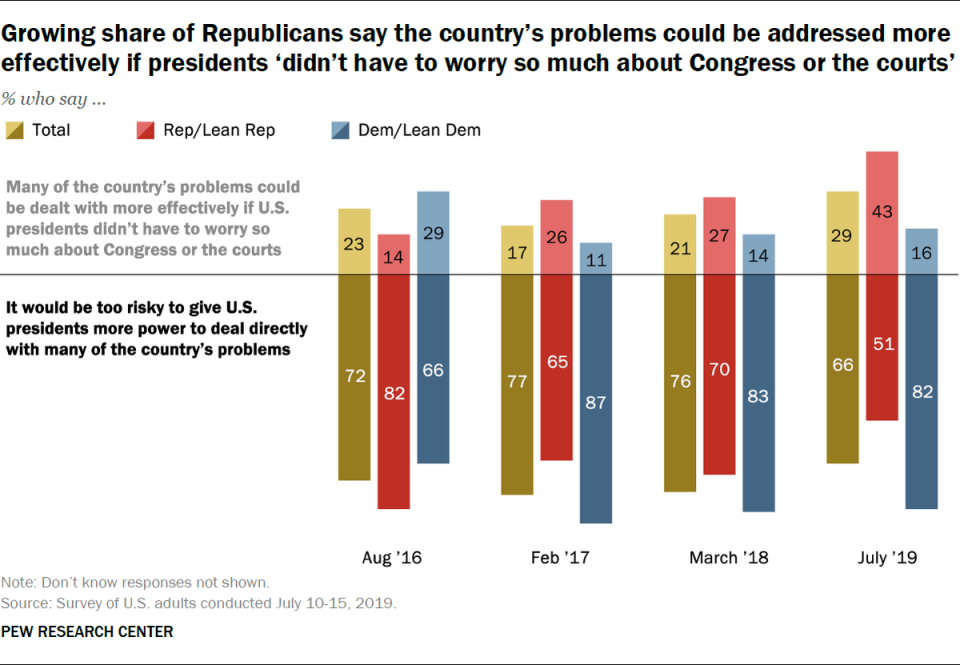The President's Fans Think He'd 'Operate More Effectively' Without Congress or the Courts

One lesson from this delightful period in American political history is that none of the stories they told you in school—about those Checks and Balances, or the Separation of Powers, or the idea we are a Nation of Laws—were real. To the extent that they ever fully applied to the United States of America in practice, the Trump Era has exposed them as malleable at best.
You see, the laws and the norms and the ethics rules are only real if people in positions of power enforce them. If they ignore them, or are too weak to exercise the powers granted to the offices they hold to stop others ignoring them, these magical forces of democracy cease to functionally exist. The president violates the Constitution's Emoluments Clause on a near-daily basis, but it doesn't seem to matter. He tried to seize funds not appropriated by Congress for his Big, Beautiful Wall, and reportedly offered pardons to people who break the law to get it built. Impeachment is a process expressly laid out in the Constitution, but the president's senior adviser just dismissed it as "unconstitutional." If you have no shame, and your opponents are too feckless to stop you, you can do anything.
That's particularly true because, as we've also learned, a significant section of the public is not particularly concerned with all these machinations of a democratic republic. It's slow, it's intricate, and to the extent people know about Checks and Balances, a growing share have stopped particularly caring about them. Perhaps, under the Obama administration, the Democratic base grew so tired of Mitch McConnell-led Republican obstructionism that they would have accepted dramatic expansions of executive power at the expense of Congress and the courts. We don't have the data for that, but we can say, thanks to an August poll by the Pew Research Center which resurfaced on my Twitter feed today, that support among Republicans for ceding powers from other institutions to the president is growing quite rapidly.

The percentage of Republicans who think it would be too risky to give presidents more power has sunk from 70 to 51 percent in a year. Since 2016, that number has fallen 31 points. The share of people polled who say presidents could operate more "effectively" if he did not have to worry about Congress or the courts is up 16 percent in a single year, to 43 percent. This poll is from this summer, before the impeachment inquiry began in earnest. Where are the numbers now? In a poll last week, 53 percent of Republicans said Trump is a better president than Abraham Lincoln.
It's hard to deny what's happening here: the support for concentrating federal power in one person is building. Some people don't seem too concerned about checks and balances. There is a partisan fluctuation at play: under Obama in 2016, the first year listed in this particular study, 66 percent of Democrats thought granting the president more power was too risky. 82 percent think so now. But among the president's base, right now, the hunger is growing for a slide towards dictatorship—something for which there's been anecdotal evidence for some time.
In February of 2017, Esquire sent a reporter to a Trump rally in Florida, and one die-hard MAGA-type in attendance explained, simply and with no little pride, that he would embrace a Trumpian dictatorship: "I don't care what he does," Bill Moro told Jeb Lund. "I'm behind him 100 percent. Put it this way: If he became a dictator, and they said, 'We want him in forever,' he's my man. He's in. I'll never vote against him ... I love his power ... It's the power that does something to me."
That last part speaks to a whole other side of this, one that seems inseparable from the growing embrace of Russian interference in American elections for Republican benefit. For the party's base, the shrinking white majority is Real America, and anything that maintains their grip on power is justifiable. Anything that keeps The Others out of power can be explained away.

Presidents from both parties have continually expanded executive power for decades, and President Obama was a prime example. He increasingly turned to executive orders in response to Rep. McConnell's scorched-earth tactics in the Senate, which in many cases served to thwart the popular will for the benefit of the narrow donor constituency McConnell truly serves. As a former professor of constitutional law, Obama was perhaps best placed to grasp there would be ramifications to this. Many men throughout history have convinced themselves they are justified in running roughshod over the institutions of democracy because they are seeking to realize the popular will or establish justice. When you've got four or eight years to cement your life's legacy, it must be near impossible to sit idly by while your entire agenda is cynically sunk.
In Trump's case, it's unlikely he even thinks in those terms. He does what he needs to do to survive and grift a little more cash. His transgressions against democratic norms and the Constitution dwarf Obama's by many orders of magnitude. In the process, he has trampled so much of what we took for granted in our democracy that it will be hard to dig it all out of the mud and hose it off before someone else comes along to trample it all some more. One lesson of the Roman republic's fall is that politicians learn from what previous politicians did. They saw what they could get away with, and how they could do it smarter. What will the next guy have learned from what Donald Trump was able to get away with? And how primed will their supporters be by then for a new order of things, where The Leader makes policy and everyone else follows it?
You Might Also Like

